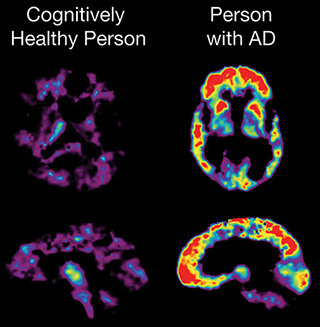DIAGNOSING ALZHEIMER’S DISEASE
The cause of Alzheimer’s disease is poorly understood and includes many environmental and genetic risk factors that are associated with its development. There are several hypotheses, but the exact cause of AD is still unknown.
Alzheimer’s is largely associated with amyloid plaques, neurofibrillary tangles, and loss of neuronal connections in the brain. The role plaques and tangles play in Alzheimer’s disease is unknown, but it is believed they disable or block communication among nerve cells and disrupt processes the cells need to survive. The destruction and death of nerve cells causes memory failure, personality changes, problems in carrying out daily activities, and other symptoms of Alzheimer’s.
Clinical diagnosis of Alzheimer’s disease is usually made during the early stage. The affected person and the family may mistake early signs of Alzheimer’s for normal age-related changes. Deciding to seek diagnostic testing can be a major hurdle for the person and the family. Various approaches and tools are used to assist in making a diagnosis. Dementia can almost always be determined, but it may be difficult to identify the exact cause. Diagnosis is made based on:
- Medical history
- Physical examination
- Neurological examination
- Mental cognitive status tests (e.g., Mini-Mental State Exam, Montreal Cognitive Assessment)
- Diagnostic laboratory tests (primarily to rule out other health issues that can cause similar symptoms to dementia)
- Brain imaging
(Alzheimer’s Association, 2021a)
Mental Cognitive Status Testing
The most widely used tools for cognitive assessment are the Mini-Mental State Exam and the Montreal Cognitive Assessment.
- The Mini-Mental State Exam (MMSE) assesses multiple cognitive domains, particularly memory and language, which may be most relevant to dementia due to Alzheimer’s disease. The MMSE can be performed in a short time period (5–10 minutes) and is most sensitive to patients at the mild to moderate stage of Alzheimer’s dementia (Alzheimer’s Association, 2021a; Slavych, 2019).
- The Montreal Cognitive Assessment is a 30-point test that assesses short-term memory recall, visuospatial ability, and different aspects of executive function. It takes about 10 minutes to complete (Mendez, 2021; Slavych, 2019).
Informant- or caregiver-completed questionnaires can also be employed. These include asking an informant who knows the patient well to answer a series of questions about the patient’s memory and other cognitive functions. Three such questionnaires are:
- Informant Questionnaire on Cognitive Decline in the Elderly (IQCODE)
- Alzheimer’s Disease Caregiver Questionnaire
- AD8 Dementia Screening Interview
Blood Test for Alzheimer’s Disease
An international research team has developed a 19-protein biomarker panel blood test for early detection and screening of Alzheimer’s disease, with an accuracy level of over 96%. This test can also differentiate among the early, intermediate, and late stages of the disease and can be used to monitor the progression of the disease over time (Jiang et al., 2021).
Imaging Studies
Structural neuroimaging is performed to rule out potentially treatable causes of progressive cognitive decline, such as stroke, small vessel disease, tumors, or hydrocephalus, and to assess specific causes (i.e., neurodegenerative or otherwise) of dementia (Alzheimer’s Association, 2021a; Lakhan, 2021).
Molecular imaging modalities include positron emission tomography (PET) and single photon emission computed tomography (SPECT). PET and SPECT can help narrow down a diagnosis by revealing deficits common in Alzheimer’s disease that are distinct from findings for other dementias.

PET scans of the brain. (Source: National Institute on Aging/National Institutes of Health.)
Functional Assessment
Functional status can be assessed using one of a number of valid and reliable instruments. Examples include:
- Lawton Instrumental Activities of Daily Living Scale
- Barthel ADL Index
- Katz Index of Independence in Activities of Daily Living
- Functional Activities Questionnaire (FAQ)